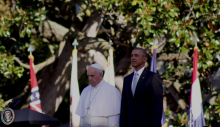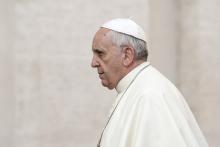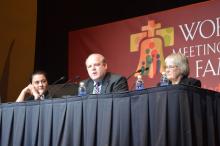Pope Francis has called “unbridled capitalism” the “dung of the devil” and criticized it for doing little to help the poor.
Pope Francis


TRANSCRIPT
GWEN IFILL: Pope Francis’ upcoming visit to the U.S. next week is generating huge interest and expectation.
Part of that excitement is rooted in the different tone the pope has taken on a number of issues, from marriage to the role of women in the church. But he has also issued a tough critique of capitalism and called for more action on climate change.

Pope Francis is not a liberal or conservative. He transcends pedestrian labels that drive wedges in American society.
So perhaps it trivializes spirituality and religion to keep political score on the pope's visit. But it also might lend instruction and context to some of our raging debates.
So here's how I score it: In the current American political context, Pope Francis was mostly, but not exclusively, left-leaning in his address to Congress on Thursday.

Stunning is the word that most comes to me after Pope Francis' two-day visit to Washington, D.C. The country and the media was reveling in his presence, using language like "amazing," "incredible," and "wonderful" in response to this extraordinary moral leader who literally transformed our public discourse in the 48 hours he was in the nation's capital. What these two extraordinary days mean going forward is the big question on all our hearts and minds.

An enthusiastic crowd of 11,000 ticketed guests gathered on the South Lawn of the White House this morning as President Obama officially welcomed Pope Francis to the United States.
Among the overwhelmingly Catholic audience there to greet him on his first US visit was a smattering of evangelical leaders.

The Pope is visiting the US this week to make the case that we should take climate change seriously and start doing something about it. He is really making the case that we should change our paradigm from one of individual self-fulfillment to one of “we’re all in this together,” from individual salvation to collective salvation of our earthly home. This has far-reaching implications. We need to be concerned about what’s happening to the earth as a whole, to humanity as a whole, and not just to our own family, town, state, country.

What kind of example does the most popular leader in the world, Pope Francis, set for American political leaders who are neck deep in election campaigns?
If you are the one presidential candidate who regularly quotes Francis, Vermont Senator Bernie Sanders, who is Jewish, you have been quoting Francis for some time and have regularly said that you share his views on climate change and economic injustice.
“I’m not quite as radical as the Pope is,” he smilingly told Time Magazine. “But.”

Next week, the conversation will change in America. All the media attention recently given to political figures will now shift to a moral leader who is changing the global public discussion about what is compassionate, just, good, and right -- and Christian.

And Pope Francis has shaken up Washington politics.
While done in a subtle manner, the pope’s speech to Congress was forthright and unyielding in reminding each lawmaker of the responsibility they have to “defend and preserve the dignity of your fellow citizens in the tireless and demanding pursuit of the common good…”
His bottom line message for the multiple issues he raised and one Congress seems to have strayed away from in recent years was, “Let us remember the Golden Rule: ‘Do unto others as you would have them do unto you’” (Matthew 7:12). Simple, right? Yet Congress seems to be out of touch with the needs of the American people.

Pope Francis issued a call to action regarding climate change in hisencyclical on the environment. In it he wrote, “We need a conversation which includes everyone, since the environmental challenge we are undergoing, and its human roots, concern and affect us all.” America’s most influential faith and moral voices are doing just that by Coming Together in Faith on Climate at the National Cathedral in Washington, D.C. during the pope’s upcoming visit to the United States. Here’s what they have to say on the need for us to join Pope Francis’ call to protect creation...

People who cover up clerical sexual abuse should be considered guilty, and God will judge priests who are unrepentant about committing such crimes, Pope Francis told journalists at the end of his U.S. tour.
Speaking aboard the papal plane from Philadelphia to Rome, where the pontiff arrived on the morning of Sept. 28, Francis said clerical abuse is “nearly a sacrilege” and the Catholic Church must take a tough line.
“For this reason the Church is strong on this and one must not cover these things up. Those who covered this up are guilty. Even some bishops who covered this up, it is a terrible thing,” the pope said, quoted by Vatican Radio.

Pope Francis began the final day of his U.S. visit by meeting privately with five adults abused as children by clergy, teachers, or family members, telling them they should expect the church to look after them and vowing “the zealous vigilance of the church to protect children and the promise of accountability for all,” including bishops.
“For those who were abused by a member of the clergy, I am deeply sorry for the times when you or your family spoke out, to report the abuse, but you were not heard or believed. Please know that the Holy Father hears and believes you,” he told the three women and two men — who he called “survivors” — at the private meeting at a seminary here on Sept. 27.
A leading victims’ advocacy group in the U.S. quickly dismissed the meeting as another “feel good, do nothing” papal meeting with survivors. This is the second time Francis has met with victims; the first was in the Vatican in July last year.
According to the Vatican’s account of the meeting, Francis expressed “deep regret” that some bishops shielded abusive priests, and added: “I pledge to you that we will follow the path of truth wherever it may lead. Clergy and bishops will be held accountable when they abuse or fail to protect children.”
The pope praised the witness of the victims, who were not identified, and said their presence was “so generously given despite the anger and pain you have experienced.”

“Brace yourself, Father,” I said, taking a seat in a plastic chair facing my would-be confessor in Madison Square Garden’s dimly lit Madison Bar on Friday, a few hours before the start of the papal mass.
The bearded Franciscan priest in his dove gray vestments laughed and said, “No way. It’s all fine. Think of it as a big embrace of forgiveness from your heavenly father.”
OK. I tried to warn you.
“Let me see if I remember how this goes,” I began. “Bless me father for I have sinned; it’s been 35 years since my last confession.”
He tried not to look startled and almost pulled it off.
“Well, I’m glad you’re here,” he said, smiling kindly as he reached beneath his cassock to pull out a small paperback tract that, he explained, contained a list of questions that he could ask me that might make recounting all of my trespasses since the third grade a little less daunting.

Pope Francis embraced survivors of 9/11 in the footprints of the Twin Towers, then prayed for peace at an interfaith service beside the last column of steel salvaged from the fallen skyscrapers.
Arriving straight from his speech to the United Nations on Sept. 25, Francis met with 10 families from the 9/11 community — people who survived the destruction, rescued others from the inferno, or lost loved ones in the worst terrorist attack in U.S. history, executed by religious zealots.

Stunning is the word that most comes to me after Pope Francis’ two-day visit to Washington, D.C. The country and the media was reveling in his presence, using language like “amazing,” “incredible,” and “wonderful” in response to this extraordinary moral leader who literally transformed our public discourse in the 48 hours he was in the nation’s capital. What these two extraordinary days mean going forward is the big question on all our hearts and minds.
At the formal welcoming ceremony on the South Lawn at the White House, a very traditional template was transformed by the “Vicar of Christ,” whose presence turned everyone’s language to one reference after another to those Christ called “the least of these” in the 25th chapter of Matthew. Never have I heard the most vulnerable being the most talked about in this city.
President Obama began the pope’s visit with these words, “What a beautiful day the Lord has made.”
Indeed. Then Pope Francis introduced himself to America as “a son of an immigrant family” who was “happy to be a guest in this country, which was largely built by such families.”
Point made.

"Climate change is a problem which can no longer be left to a future generation." — Pope Francis
To mark Pope Francis' visit to the United States, Sojourners has partnered with NextGen Climate to convene key interfaith leaders and activists to welcome the Pope and his call to action on climate change.
The effort, including a full-page advertisement on Sept. 25 in the New York Times and several other newspapers, features a letter signed by 36 interfaith leaders and activists.

Just as the single session on homosexuality at this Vatican-approved meeting of Catholic families was to begin on Sept. 24, a conference official took the stage in the main hall, capable of seating at least 10,000, and announced the location had been moved.
Thousands of people got up and made their way up one floor to another room capable of seating only about 1,000. Hundreds of others were turned away, the doors shut on them by convention center officials citing fire code regulations.

At his speech before Congress on Sept. 24, Pope Francis listed Trappist monk Thomas Merton as one of four exemplary Americans who provide wisdom for us today.
Out on the National Mall, thousands cheered when the pope named two other exemplary Americans: Abraham Lincoln and Martin Luther King Jr. Fewer recognized Merton (or the fourth exemplar the pope mentioned, social activist Dorothy Day.)
The pope did not choose to hail anyone associated with the institutional Catholic Church as his models. Instead he chose a former president, a Protestant minister, a lay Catholic, and a monk.

Pope Francis went straight from charging the U.S. Congress to care for the neediest to blessing and encouraging Washington’s hungry and homeless on Sept. 24.
Still, Francis, wearing his cross showing a shepherd and his flock, carried a political message along with his pastoral mission.
“The Son of God came into this world as a homeless person,” he told staff and clients of Catholic Charities, at St. Patrick’s in the City’s ministry to the needy.
When a soft-spoken, white-robed, wisdom-dispensing sage took the stage this morning before Congress, his affect seemed a little...familiar. Former Sojourners staffer Danny Mortensen proclaimed him the "Christian Gandalf," and (okay, all disputes as to whether Gandalf is the original Christian Gandalf aside) we totally dig it.